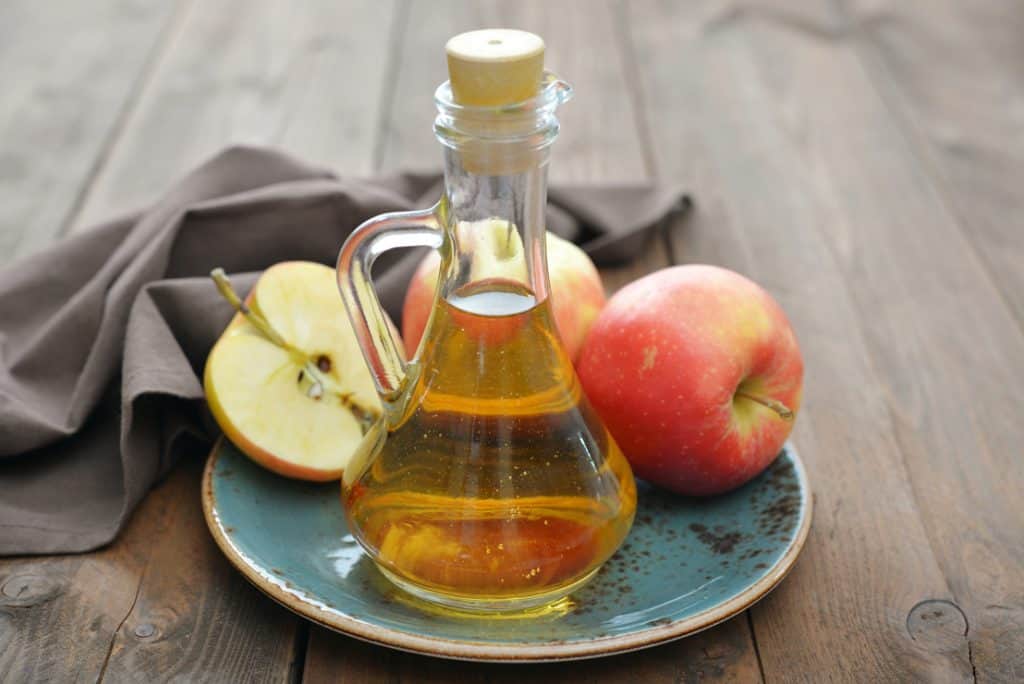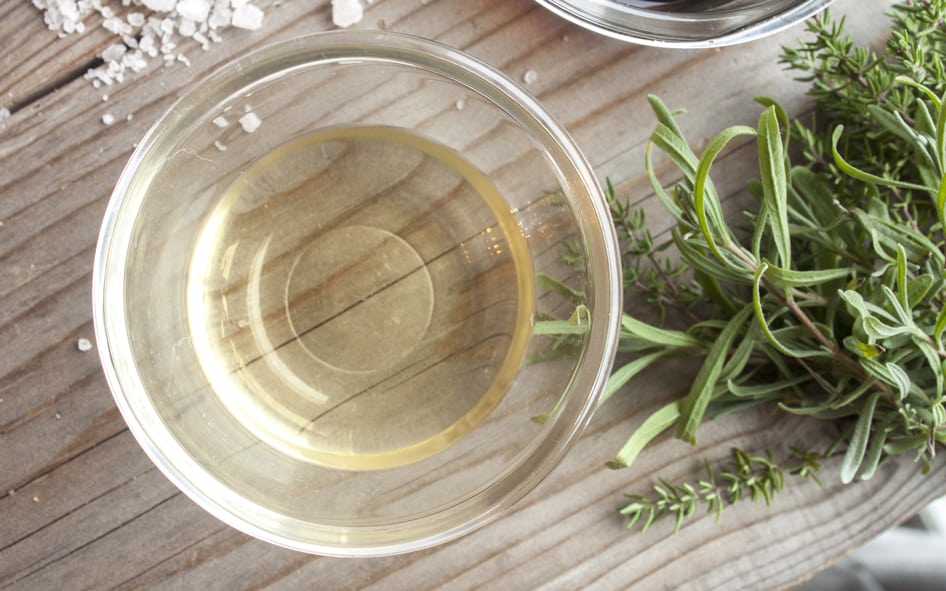![Apple Cider Vinegar vs White Vinegar [Differences & Similarities]](https://myfermentedfoods.com/wp-content/uploads/2019/10/1-Depositphotos_138942738_xl-2015-1024x683.jpg)
Vinegar has long since been used as a staple in medicine, cooking, and for cleaning purposes. A question most people ask is what is the difference between apple cider vinegar and white vinegar? Are they interchangeable? Can we use one in place of another for health, beauty, cooking, and cleaning? In this guide, we will answer those questions.
What is apple cider vinegar?

A surprisingly simple process yields a powerful finished product that is being hailed as the elixir of health and beauty! Apple cider vinegar (or ACV as it is fondly known) is made directly from apples using special yeasts. ACV is formed by a double fermentation process where, in step one, alcoholic apple cider is formed which is then, in step two, fermented again to yield apple cider vinegar.
What is white vinegar?

White vinegar is formed from corn or other grain bases which are distilled into corn/grain alcohol (ethyl alcohol). Additional ingredients are then added to the alcohol and allowed to ferment into white vinegar. The fermentation process is allowed to continue until all of the alcohol has left the product and only vinegar remains. Like ACV, white vinegar is completely natural.
What are the differences between ACV and white vinegar?
White vinegar is not made from fruits or apples like ACV. That is why it lacks the distinct aroma associated with apple cider vinegar.
Distilled white vinegar is usually preferred commercially for use in pickling and preservation of foods. Because it lacks the deep red or brown color associated with apple cider vinegar, white vinegar is a better choice for use on lighter colored vegetables like cauliflower and onion.
In short, as far as the manufacturing process is concerned; apple cider vinegar starts with apple cider whereas acidic distilled white vinegar starts with ethyl alcohol.
Here are the main differences in applications of the two vinegars:
In cooking
Both vinegars are useful in cooking and are often used interchangeably. This means that you can safely substitute apple cider vinegar for white vinegar in a recipe, and vice-a-versa.
White you can use white vinegar for fermenting, I do not recommend it because it has no beneficial bacteria like ACV does.
Apple cider vinegar has a distinct sweetish-tart taste that is useful in sweeter pickles, whereas white vinegar is more useful if you don’t want the ACV color.
Cider vinegar is great in sweet salad dressings where white vinegar does not have much to add there.
For cleaning
For household cleaning purposes, white vinegar is preferred over apple cider vinegar. This is because white vinegar has a whitening effect whereas ACV tends to stain the surfaces reddish brown.
White vinegar is an excellent deodorizer. It is extremely useful in cleaning toilet bowls and kitchen and bathroom tile grout. You can also use both for laundry and clothes cleaning but again, the preferred vinegar is white vinegar. White vinegar removes all kinds of stains and it also acts as a natural, inexpensive fabric softener.
White vinegar is often manufactured from leftover products that are not only plentiful but also inexpensive. That is why it is one of the cheapest vinegar’s available in the market.
Since most cleaning chores call for plenty of vinegar, it is better to use white vinegar instead of ACV. ACV tends to be more expensive, especially when you buy organic, unpasteurized, unfiltered, and raw varieties.
For health and medicinal purposes
Apple cider vinegar is a lot healthier than distilled white vinegar. ACV is made by crushing apples along with its skin, seeds, and stems. These apple parts are then subjected to fermentation which turns the sugar in them into alcohol. The alcohol undergoes oxidation and converts it into acetic acid or vinegar.
Distilled white vinegar does not undergo double fermentation. It is also devoid of the ‘mother’ enzyme found in raw, organic, and unpasteurized ACV. This mother enzyme contains tons of minerals, vitamins, and probiotic goodness which make apple cider vinegar so good for health and wellbeing.
White vinegar may be good for deodorizing, disinfecting, and cleaning household surfaces, killing weeds in the garden, and removing stains and odors from sweaty and dirty clothes; but it is not beneficial health-wise like apple cider vinegar is.

Here are some benefits of ACV which are not present in white vinegar:
- Promotes alkalinity – Drinking 2 tbsp of ACV daily may restore energy and balance by fighting inflammation and free radicals.
- Relieves acid reflux and heartburn – Drinking a couple of teaspoons of organic apple cider vinegar on an empty stomach and before meals may help prevent symptoms of acidity and heartburn.
- Aids in weight management – Drinking ACV before meals curbs appetite and may help in weight loss (when used with a healthy, balanced diet and exercise regime).
- Clears up the skin – You may want to apply ACV topically to the skin post-cleansing to fight blemishes, wrinkles, acne, and other skin issues.
- Detoxifies the colon – ACV detox is a powerful method of cleansing the colon out. It removes toxins from the body by encouraging lymphatic drainage and preventing constipation. It breaks up congestion and mucus from the body.
- Great for the hair – ACV can be used externally as an after-shampoo rinse to add a healthy shine to dry, frizzy, and damaged hair.
- Prevents colds and coughs – With regular intake of ACV, your immunity may increase and your body may be better equipped to fight infections, colds-coughs, allergies, and seasonal disorders.
See a complete list of apple cider vinegar benefits.
In short: the right kind of vinegar for health, beauty, weight management, and overall well-being is apple cider vinegar.
Conclusion
Apple cider vinegar is alkalizing to the body. It also offers the ‘mother’ enzyme which imparts many health benefits which white vinegar does not. Both vinegars are used in cooking, often interchangeably. But apple cider vinegar is an exception and its primary use has become health related.
White vinegar is often made from leftover products which are plentiful and cheap. That is why the cost of white vinegar is also less. This makes it affordable and practical for use in cleaning.
Although both white vinegar and apple cider vinegar are made using the same process, the similarities end there.
Related posts
The 10 Best Apple Cider Vinegar Brands You Should Buy [Ranked]

Leave a Reply